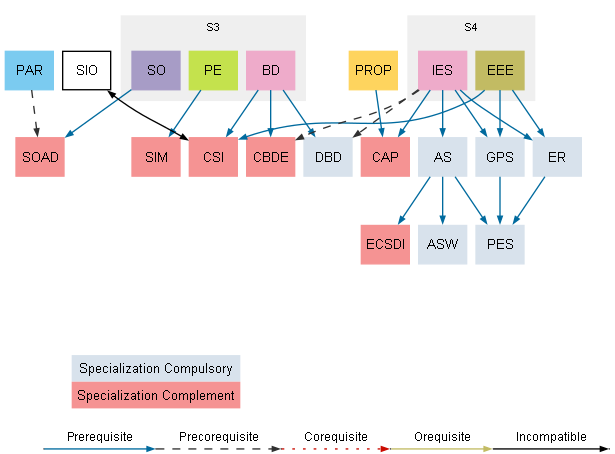Software Engineering
Have a look at the briefing of this specialisation:
Career options
Software is an important element in IT systems and has become the fulcrum of IT services for individuals and organisations, leading to widespread use of the term “software as a service”. The service sector is the mainstay of developed economies and the area that has shown the greatest economic growth in recent years, and the concept of services is now largely inseparable from the software upon which these services are built.
Informatics engineers with specialised training in Software Engineering can pursue a wide range of careers, including skilled and management positions in the following areas:
- Development of software services and systems, working with the latest software engineering methods, techniques and tools.
- Requirements engineering, software architecture, database administration, and any other area related to informatics.
- Software engineering reviewing and auditing for organisations, and the design and implementation of management and quality improvement plans.
Specialization coordinator
| Person | Department | |
|---|---|---|
| Gómez Seoane, Cristina | ESSI |
Specialization teachers
Technical Competences of each Specialization
SOFTWARE ENGINEERING SPECIALIZATION
- CES1
To develop, maintain and evaluate software services and systems which satisfy all user requirements, which behave reliably and efficiently, with a reasonable development and maintenance and which satisfy the rules for quality applying the theories, principles, methods and practices of Software Engineering.- CES1.1
To develop, maintain and evaluate complex and/or critical software systems and services. - CES1.2
To solve integration problems in function of the strategies, standards and available technologies - CES1.3
To identify, evaluate and manage potential risks related to software building which could arise. - CES1.4
To develop, mantain and evaluate distributed services and applications with network support. - CES1.5
To specify, design, implement and evaluate databases. - CES1.6
To administrate databases (CIS4.3). - CES1.7
To control the quality and design tests in the software production - CES1.8
To develop, mantain and evaluate control and real-time systems. - CES1.9
To demonstrate the comprehension in management and government of software systems.
- CES1.1
- CES2
To value the client needs and specify the software requirements to satisfy these needs, reconciling conflictive objectives through searching acceptable compromises, taking into account the limitations related to the cost, time, already developed systems and organizations.- CES2.1
To define and manage the requirements of a software system. - CES2.2
To design adequate solutions in one or more application domains, using software engineering methods which integrate ethical, social, legal and economical aspects.
- CES2.1
- CES3
To identify and analyse problems; design, develop, implement, verify and document software solutions having an adequate knowledge about the current theories, models and techniques.- CES3.1
To develop multimedia services and applications. - CES3.2
To design and manage a data warehouse.
- CES3.1
Subjects
Specialization compulsory subjects
- Software Architecture (AS)
- Prerequisite: IES - Introduction to Software Engineering
- Web Applications and Services (ASW)
- Prerequisite: AS - Software Architecture
- Database Design (DBD)
- Prerequisite: BD - Databases
- Precorequisite: IES - Introduction to Software Engineering
- Requirements Engineering (ER)
- Prerequisite: EEE - Business and Economic Environment
- Prerequisite: IES - Introduction to Software Engineering
- Software Project Management (GPS)
- Prerequisite: EEE - Business and Economic Environment
- Prerequisite: IES - Introduction to Software Engineering
- Software Engineering Project (PES)
- Prerequisite: AS - Software Architecture
- Prerequisite: ER - Requirements Engineering
- Prerequisite: GPS - Software Project Management
Specialization complementary subjects
- Advanced Programming Concepts (CAP)
- Prerequisite: IES - Introduction to Software Engineering
- Prerequisite: PROP - Programming Projects
- Concepts for Specialised Databases (CBDE)
- Prerequisite: BD - Databases
- Precorequisite: IES - Introduction to Software Engineering
- Information Systems Concepts (CSI)
- Prerequisite: BD - Databases
- Prerequisite: EEE - Business and Economic Environment
- Knowledge Engineering and Distributed Intelligent Systems (ECSDI)
- Prerequisite: AS - Software Architecture
- Simulation (SIM)
- Prerequisite: PE - Probability and Statistics
- Operating Systems for Distributed Applications (SOAD)
- Precorequisite: PAR - Parallelism
- Prerequisite: SO - Operating Systems

Requisites between subjects
© Facultat d'Informàtica de Barcelona - Universitat Politècnica de Catalunya - Website Disclaimer - Privacy Settings


